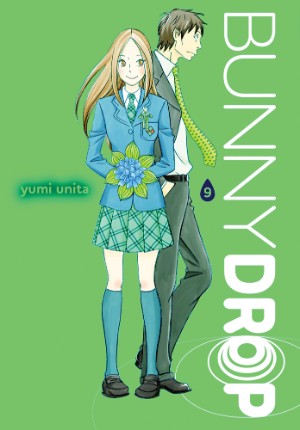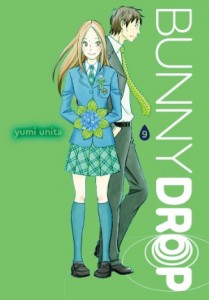By Yumi Unita. Released in Japan as “Usagi Drop” by Shodensha, serialized in the magazine Feel Young. Released in North America by Yen Press.
You may finally discuss Bunny Drop in the comments. But be polite.
And so here we are. I’d mentioned when reviewing the previous volume of Bunny Drop that there was a certain discomfort with where it was going, even if there wasn’t really anything objectionable besides the basic concept. That feeling continues and is magnified in this volume, which could almost be described as “Yeah, it went there.” It does its best to try to show the thought patterns of the people this decision impacts – though Rin, as always, is harder to read and understand than the others. But in the end, was this trip really necessary? Let’s find out.
For most of the volume, the basic conflict is not so much “Rin is in love with Daikichi” – that was dealt with by Vol. 8, mostly. The conflict is that Rin seems to be perfectly content to never deal with this and live in her happy family cocoon forever, denying her own feelings so that things can be the same. And big props to Kouki for pointing out how selfish this is. Honestly, Kouki’s development has probably been written better than Rin’s as this series has gone along – he’s still very much in love with her, and knows that love can’t happen, but is determined to be sure that Rin is happy. What she’s doing now isn’t getting her that way. So, because he’s that sort of person, he simply tells Daikichi everything.
Yumi Unita’s art has always been best when showing feelings of awkward discomfort, and really excels here in the middle part of the book, as Daikichi has to deal with Rin’s feelings, and Rin has to deal with Daikichi knowing about it, and – inevitably – the destruction of their cozy parent-child relationship. I liked that she ended up going to her mother – whose character development has also been good but is mostly off-screen. The mother, of course, is there to provide the “”out” the story needs – Rin isn’t really Soichiro’s daughter, she’s an adopted daughter. Meaning she and Daikichi aren’t related by blood. Which is fine, except, y’know, he’s still raised her as a parent since she was six. Sigh.
Daikichi says to Rin he’s going to wait two years, possibly thinking that Rin might get over this. But of course she does not. Through most of the post-timeskip series we’ve had trouble reading Rin, but right at the end it’s Daikichi who becomes difficult, as his acceptance of Rin’s love and agreement to marry her seems to come less from romantic feelings and more “well, a father can’t say no to his daughter”. Which provides all sorts of deeply wrong reactions. Particularly when Rin brings up children right at the end.
There is a certain odd dilemma with this series. When it began, everyone was enchanted by its warm and loving take on parenting and adopted families, and recommending it to libraries and such. Then the spoiler hit, and suddenly the entire fandom took a darker turn. The anime solved this problem by simply ignoring the timeskip altogether. The difficulty is that if readers had known the manga was going to go down this direction, I don’t think any of them would have bought the series. Most people still reading have a sense of “Well, better see this through to the end, since I’ve invested so much time in it.” Which is not what one really wants from a heartwarming manga series. Bunny Drop could be very well-written, and thoughtful, and have nice art, and I’ve analyzed it more than most other series. But I don’t think I’ve ever felt quite as uncomfortable with an ending as I am with this one.
Of course, there’s Vol. 10 in April of next year. But I hear that’s mostly side-stories from when Rin was a kid. We shall see. (What, drop the series? Nah.)


Well at least I don’t feel like the only person who felt uncomfortable with the post time skip stuff now it’s just often times when the subject of incest or “pseudo incest” gets brought up there seems to be one person who takes it to the logical extreme and says “If they love each other than it’s okay.” Don’t think this will happen over here though thankfully
I was fortunate enough to stop reading this series after I realized that Daichi wasn’t going to end up with Kouki’s mom (I was annoyed at the whole “Let’s waste time building a kind of romance and then screw it over” so I didn’t want to put up with that again). And while her end was complete bullcrap, I’m glad I didn’t stick around to actually read this ending. But now that I know WHY that relationship was a waste of time I’m just pissed. We traded a relationship between two middle aged single parents, something that I never see in manga and thought was actually interesting, for this?
And, could someone explain this to me, I don’t want to make generalizations, but what is up with Japan and this whole idea of “They’re not related by blood so it’s okay”?
As far as I can figure the “non blood related” thing is some quirk of Japanese law where you could potentially legally marry your’e step siblings (even your first cousin although I don’t know if this is true or not as I’ve had friends who lived over in Japan say this isn’t so).
Also the idea of raising and than marrying a girl has deep roots in Japanese culture going as far back as I believe The Tale of Genji, ( have’nt read the whole novel so I can’t be 100% sure). Ultimately it’s a cultural standard that is seen from a culture that has it’s main moral system built around animism and nebulous concepts of propriety. That’s just my opinion though.
I had been hearing about Buddy drop for a while and had been strongly considering picking it up when the leak happened and I decided it was good that I hadn’t gotten into the series. (Heaven knows I had enough of the “I’m this far along I need to see it through to the end” with Hot Gimmick) . I consider it unfortunate that Buddy Drop went in that direction.
Yes, there is a literary history to the “raising one’s wife” that did start with Tale of Genji, though 1, Genji was only like 6 years older than Murasaki (I could be off on that numbers, this is off the top of my head a few years since I last read the book). And 2, there was more nuance I think to the Genji situation that tends to get forgotten in the more simplistic “raising one’s wife” theme seen mostly in popular culture.
Yeah I haven’t read Tale of Genji I just know that it’s sort of the” trope codifier” for this sort of thing is all sure it’s probably more nuance and everything. With that being said it’s the seed bed for this very kind of trope. Also my sympathies for having suffered through all of Hot Gimmick words can’t describe how much I hate that series.
Pingback: Bunny Drop Book 9 » Manga Worth Reading